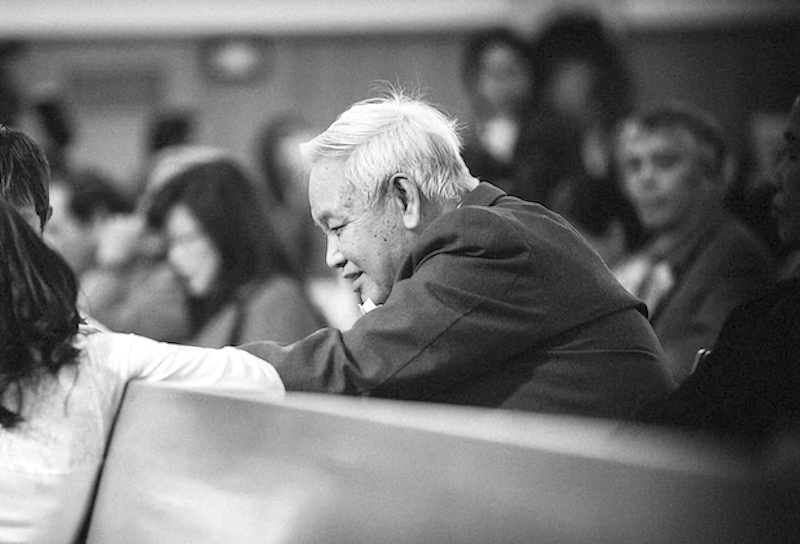Dancing In the Rain

September 15, 2021
by Teresa
In the Vietnamese language, there is a phrase to offer your condolences to someone when a loved one passes — “chia buồn” — which roughly translates to, “I share in your sadness.” I’ve always found it poignant and have yet to find a phrase in English which can succinctly convey the same sentiment; that if the weight feels too much for one person to bear, please allow me to help you carry it.
This past summer, my grandpa passed away, peacefully and surrounded by loved ones after many years of suffering many strokes. Recounting his life, I realized I had known him as ill for more years of my life than I had not. Growing up, most of my interactions with him existed within the confines of a skilled nursing facility. This past summer, I was also completing my first Level II fieldwork experience in a skilled nursing facility.
During his celebration of life, my family went around the room sharing stories about grandpa. After my dad retired, he took upon the role as an informal caregiver to my grandpa and shared how much grandpa hated my dad’s visits to the nursing facility because he knew that meant it was time for a bath. My mind went, “OT!” but everyone took the light-hearted story for what it was and laughed, including myself. A few weeks later during fieldwork, I was notified that a family member wanted my patient to work on bathing during OT that day.
My patient did not want to work on bathing during OT that day.
They were protesting against the task, bargaining with me, and apologizing for how their disability was inconveniencing my work. I thought of my grandpa and how I would want a therapist to approach the situation if it was him. In places like skilled nursing facilities, there is so much loss of control. People have little to no control in their routine, what and when to eat, what medications they take, and how quickly (or slowly) their body is changing. So when a bright-eyed young OT student comes knocking on their door, asking if they want to take a bath, they say “no” — and you let them, because it returns just a tiny sliver of control to their life.
On several occasions, concerned family members entered the rehab gym with questions about their loved one’s progress during therapy. While others avoided eye contact so as not to get flagged down with questions, I’d approach them and provide updates as best I could. Afterwards, therapists would say to me, “You’re a student — you didn’t have to do that” to which I would reply, “I wanted to.” Just as much as I want to share in victories with patients and their families, I want to share in their sadness with them as well because it’s how I would want my own loved ones to be treated by providers.
Dr. Rafeedie often says how “occupational therapists teach people how to dance” but I’d like to add a stipulation — that sometimes, we teach people how to dance in the rain. That sometimes, in even the bleakest of places, you can teach people how to flip their outlook on life, flip the way they move and feel, and flip the way the system works because as occupational therapists, you’re well-equipped to. OTs possess the impeccable ability to take an unfortunate situation and turn it into something wonderful.
I lost my grandpa this summer yet somehow, I still saw him a lot. I saw him through my patients and the cheesy jokes they’d crack during our sessions. When they encouraged me to work hard in school and finish strong, I heard my grandpa cheering me on. On their families’ faces, I saw my own family’s faces — the looks of desperation, of encouragement, of sorrow, of hopefulness. To whoever is reading this with a heavy heart: I share in your sadness with you, whatever it may be. The rain is clearing and the sunshine is coming, I can feel it. Let’s dance.

In loving memory of Thomas Dương Đức Thanh
⋯
Next by tag Fieldwork ⟩ What are OS/OT? ⟩
⋯





